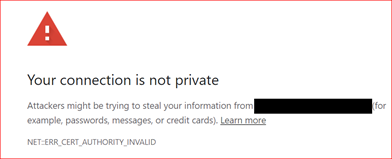

The importance of having an SSL Certificate
Blogs
First Published on Safenames.net
Security is something that we should all take seriously. In the real world, we can change our locks, and get better more secure ones. The options are endless and there is always going to be a better and more secure one depending on your needs and specific circumstances.
In the online world, there are many security issues to worry about and companies are always looking for better ways to assure their potential users that their information is safe when interacting with them. After all, the world of transactions is a 2-way street requiring some level of trust, assurance, and socially distant handshaking.
This is where the Transport Layer Security (TLS), most commonly referred to by its older term – Secure Socket Layer (SSL). In this article, I am going to attempt to explain the world of SSL/TLS in the briefest possible manner whilst giving you a satisfactory understanding of the world of online web security, where certificates are involved, and what that may mean for your organization.
Why do you need an SSL/TLS Certificate?
We can all agree that there are many bad actors masquerading as otherwise on the World Wide Web. Their main aim is to get a hold of your personal information any way they can. One of the ways they achieve this is to intercept the communication between the browser and an unsecured site. With the right SSL/TLS certificate from a trusted Certificate Authority (CA), you ensure a secure internet connection by encrypting the data sent between the browser and an SSL/TLS secured website.
What are the benefits of having an SSL/TLS Certificate?
Since its introduction in the mid-90s, SSL/TLS has become the standard that all major browsers use to ensure a secure connection. Just like many things software, there have been many versions; more secure with every iteration and by introducing a stronger hash algorithm and patching discovered security floors, you can rest easy knowing that you have the most up-to-date SSL/TLS (current version as of this blog is TLS 1.3). As such having an up-to-date certificate on your website shows clients and potential clients that you take the security of their personal information very seriously.
Surveys have also shown that sites with SSL/TLS certificates are more trusted by users because they know their private information is encrypted and protected. As well as being more likely to appear in top search engines. Many of the top browsers will also warn users when they are about to interact with a site that has not been secured with an SSL/TLS and boost those that are secured. Some may even block the user from accessing the site altogether. In many ways, it can also be used as a great SEO tool.


What are the types of SSL/TLS?
Your first steps into the world of SSL/TLS Certificates can be intimidating. With so many to choose from, how do you know if you are getting the right one? We can really get into the thick of it and delve as far as the rabbit hole goes with SSL/TLS but, we will be left in a situation where we won’t see the proverbial forest for the trees. So, lets take a step back and look at the big 3:
- Domain Validated (DV)
- DV certs are the lowest level of authentication with only control of the domain name being required as proof to have a cert issued. This makes it the cert of choice for entities looking to remain anonymous. It is also the most inexpensive and the right one can secure many domains and sub-domains. This makes it the ideal choice for cloud service providers and hosting companies.
- Organization Validated (OV)
- OV certs start where the DV certs left off. As the name implies, to apply for this level of certificate you need to also submit brand/organization information which will be validated to make sure the entity ordering the cert has the right to do so. Unlike the DV, this information will be displayed on the certificate when issued. This provides another level of brand protection and it is the preferred certificate for most organizations as users can check to make sure they are indeed interacting with the right company. This is also the ideal cert for public-facing sites that collect and store user information.
- Extended Validation (EV)
- Like the OV did with the DV, EV certs pick up from where we left off. However, we yet again go one step further as this is the highest level of certificate you can currently get. It signals to your users that you are committed to the highest level of security when it comes to their personal information. As well as verifying the organization information, it also validates an individual at the organization who will be the last point of call before the cert is issued. This is the most expensive type of certificate you can get and it is often used by high-profile sites that collect a lot of personal information and utilises some form of online payment option.


















